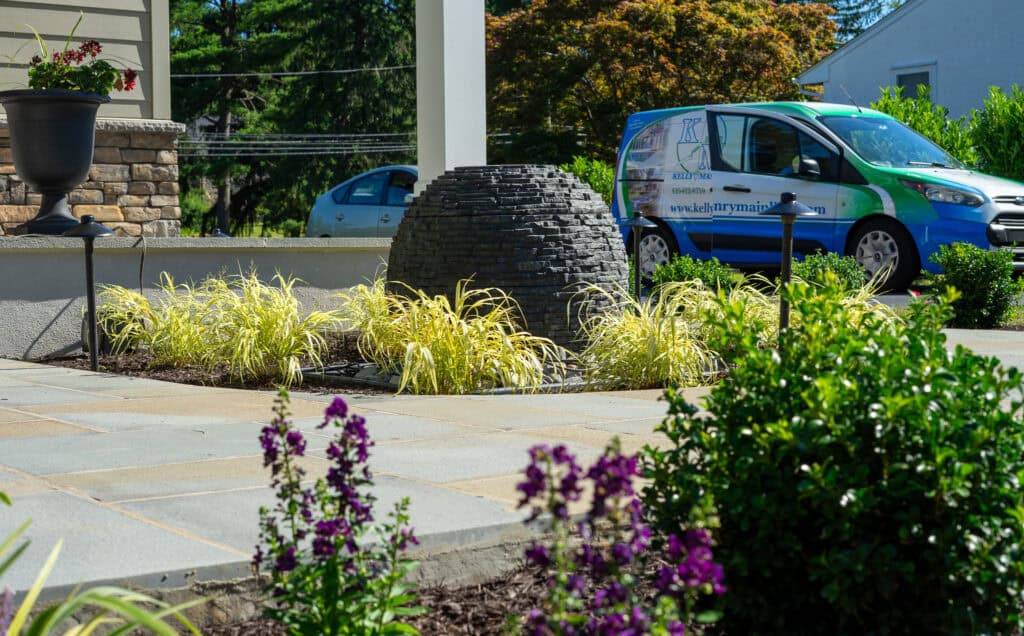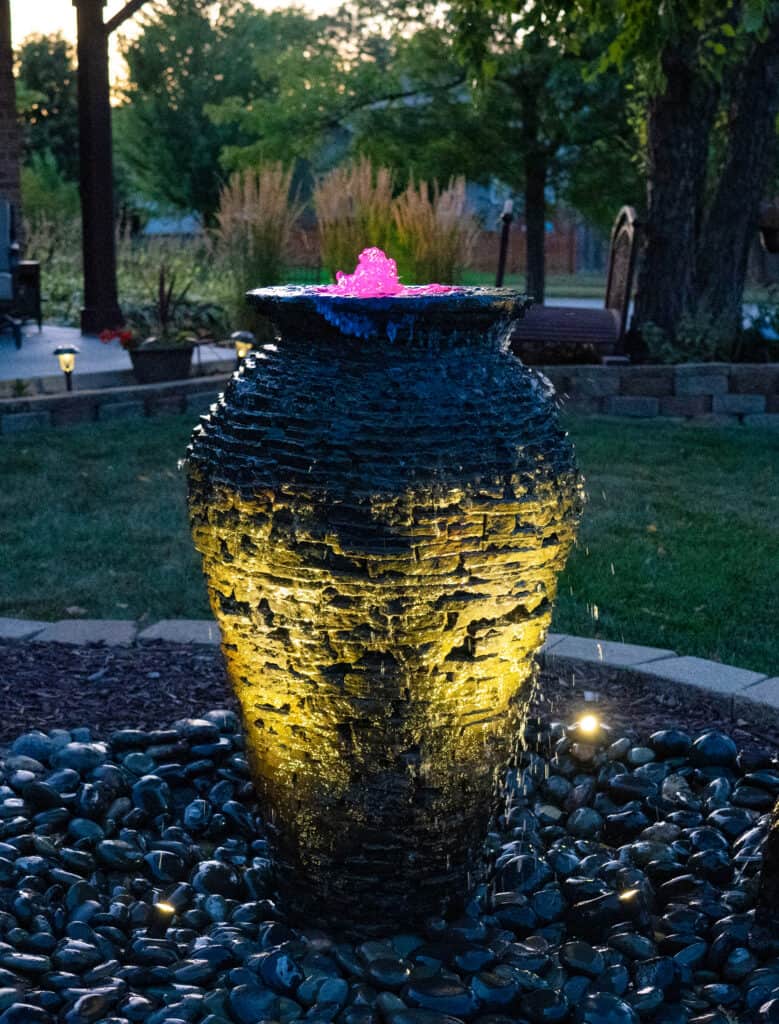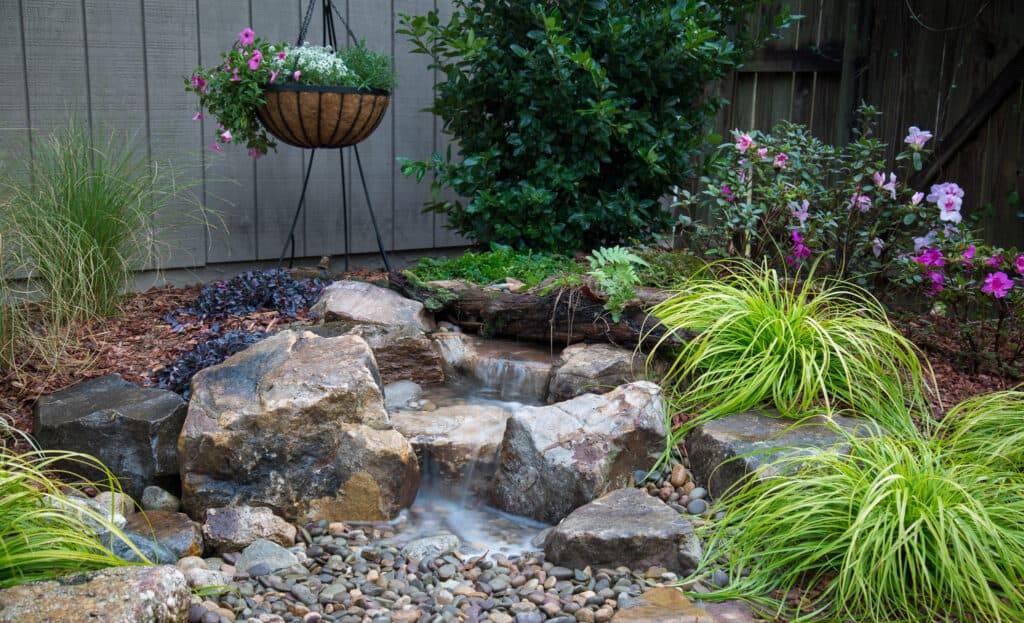Water features have the power to transform an ordinary backyard into a peaceful oasis. The soothing sound of flowing water, the visual appeal of a custom fountain, and the ability to attract wildlife all contribute to a more enjoyable outdoor space. Whether you have a sprawling garden or a small patio, adding a water feature can enhance your landscape and increase property value.
But with so many options available, how do you choose the right water feature for your home? From ponds and waterfalls to sleek fountains and bubbling streams, the choices can be overwhelming. The key is to find a feature that complements your space, fits your lifestyle, and aligns with your maintenance preferences.
In this guide, we’ll walk you through the essential factors to consider when selecting a water feature. By the end, you’ll have a clear understanding of what works best for your landscape and how to bring your vision to life with the help of a professional water feature contractor.

Step 1: Assess Your Space – Finding the Perfect Spot
Choosing the right water feature starts with evaluating the space you have available. A small courtyard or patio will benefit from a compact custom fountain, while a larger backyard can accommodate an expansive pond or cascading waterfall. The size of your yard plays a crucial role in determining which water feature will fit seamlessly into your landscape.
Next, consider the location. Do you want your water feature to be a focal point in your garden, or do you prefer a subtle accent near a seating area? Placing a fountain near an outdoor lounge space creates a calming atmosphere, while a koi pond can be a beautiful centerpiece in a landscaped garden. Think about how the feature will interact with existing plants, hardscaping, and pathways.
Sun exposure is another critical factor. If you’re installing a pond, too much sunlight can lead to excessive algae growth, requiring more maintenance. On the other hand, a shaded area may keep the water cooler and reduce evaporation. A water feature contractor can help you assess the best placement based on your yard’s conditions.
Access to a power source and water supply should also be considered. Fountains and waterfalls require pumps to circulate water, so choosing a location with easy electrical access is essential. Solar-powered options are available, but they may not be as powerful as electric models. Understanding these logistical elements will help streamline installation and maintenance.
Lastly, think about visibility. A well-placed water feature should be enjoyed from multiple vantage points. Whether you want to admire it from your patio, a kitchen window, or a garden bench, positioning it in a spot with a clear view will maximize its impact on your outdoor space.

Step 2: Define Your Purpose – What Do You Want to Achieve?
Before deciding on a water feature, it’s essential to define your goals. What do you hope to achieve with this addition to your landscape? Understanding your objectives will help you choose the perfect feature that aligns with your vision and lifestyle.
If your primary goal is to create a peaceful retreat, consider a custom fountain or a small pond with a gentle waterfall. The sound of flowing water has been proven to reduce stress and promote relaxation, making it an ideal choice for homeowners looking to create a tranquil outdoor environment.
For those who want to attract wildlife, a pond or birdbath can invite birds, butterflies, and beneficial insects to your garden. Adding aquatic plants and fish can further enhance the natural ecosystem, creating a vibrant and dynamic outdoor space. A water feature contractor can help design a pond that supports local wildlife while remaining low maintenance.
If aesthetics are your main concern, you might prefer a sleek, modern fountain or a dramatic cascading waterfall. These features can serve as statement pieces, adding elegance and sophistication to your landscape. A well-designed water feature can elevate your property’s curb appeal and even increase its market value.
Lastly, consider functionality. Some homeowners choose water features to help mask noise pollution from nearby roads or neighbors. A strategically placed waterfall or fountain can create a soothing white noise effect, enhancing privacy and making your outdoor space more enjoyable.
Step 3: Explore Your Options – Which Water Feature Suits You?
With a clear understanding of your space and purpose, it’s time to explore different water feature options. Each type offers unique benefits and maintenance requirements, so selecting the right one depends on your lifestyle and preferences.
Ponds
Ponds bring a natural, organic feel to any garden. They can be designed with aquatic plants, koi fish, and even small waterfalls. While beautiful, they require filtration systems to keep the water clean and free of algae. A water feature contractor can guide you on the best materials and maintenance practices to ensure your pond remains pristine.
Fountains
Fountains come in various styles, from classic tiered designs to contemporary, minimalist sculptures. They require little maintenance compared to ponds and are ideal for smaller spaces. A custom fountain can be a stylish centerpiece for courtyards, patios, or front yards.
Waterfalls
Standalone waterfalls or those integrated into ponds offer a dynamic visual and auditory experience. They require proper water circulation to prevent stagnation, making professional installation essential. Waterfalls are great for large landscapes and can be combined with rock formations for a natural look.
Streams
Artificial streams create a meandering water path through your landscape. They require more space but can add a touch of serenity and movement to any yard. These are best installed by an outdoor living contractor to ensure proper grading and water flow.
Birdbaths
For a simple, budget-friendly option, a birdbath is perfect for attracting birds while adding a decorative touch. They require regular cleaning but don’t need pumps or electricity, making them an easy addition to any garden.

FAQs – Common Questions About Water Features
1. Are water features high maintenance?
Maintenance varies depending on the type of water feature. Fountains and birdbaths require minimal upkeep, while ponds and waterfalls need regular cleaning and filtration.
2. Can I install a water feature myself?
Small fountains and birdbaths can be DIY projects, but larger features like ponds and waterfalls should be installed by a water feature contractor to ensure proper functionality and longevity.
3. Will a water feature increase my home’s value?
Yes! A well-designed custom fountain or pond can boost curb appeal and attract buyers who appreciate a beautifully landscaped yard.
4. What is the best water feature for a small yard?
For small spaces, a custom fountain, wall-mounted waterfall, or compact pondless waterfall is ideal. These options provide visual appeal without overwhelming the area.
5. Do water features attract mosquitoes?
Not if they have proper circulation. Mosquitoes breed in stagnant water, so using a pump or aeration system will prevent infestations.
Let Kelly Masonry Bring Your Vision to Life
Choosing the right water feature for your landscape requires thoughtful planning, but the result is a stunning, tranquil space you can enjoy for years. Whether you prefer a modern custom fountain, a peaceful pond, or a cascading waterfall, there’s a perfect option for every yard.
If you’re ready to enhance your outdoor space with a professionally installed water feature, trust the experts at Kelly Masonry. As an experienced water feature contractor, they specialize in designing and installing stunning fountains, ponds, waterfalls, and more.
Contact Kelly Masonry today to start transforming your landscape into a breathtaking oasis!
